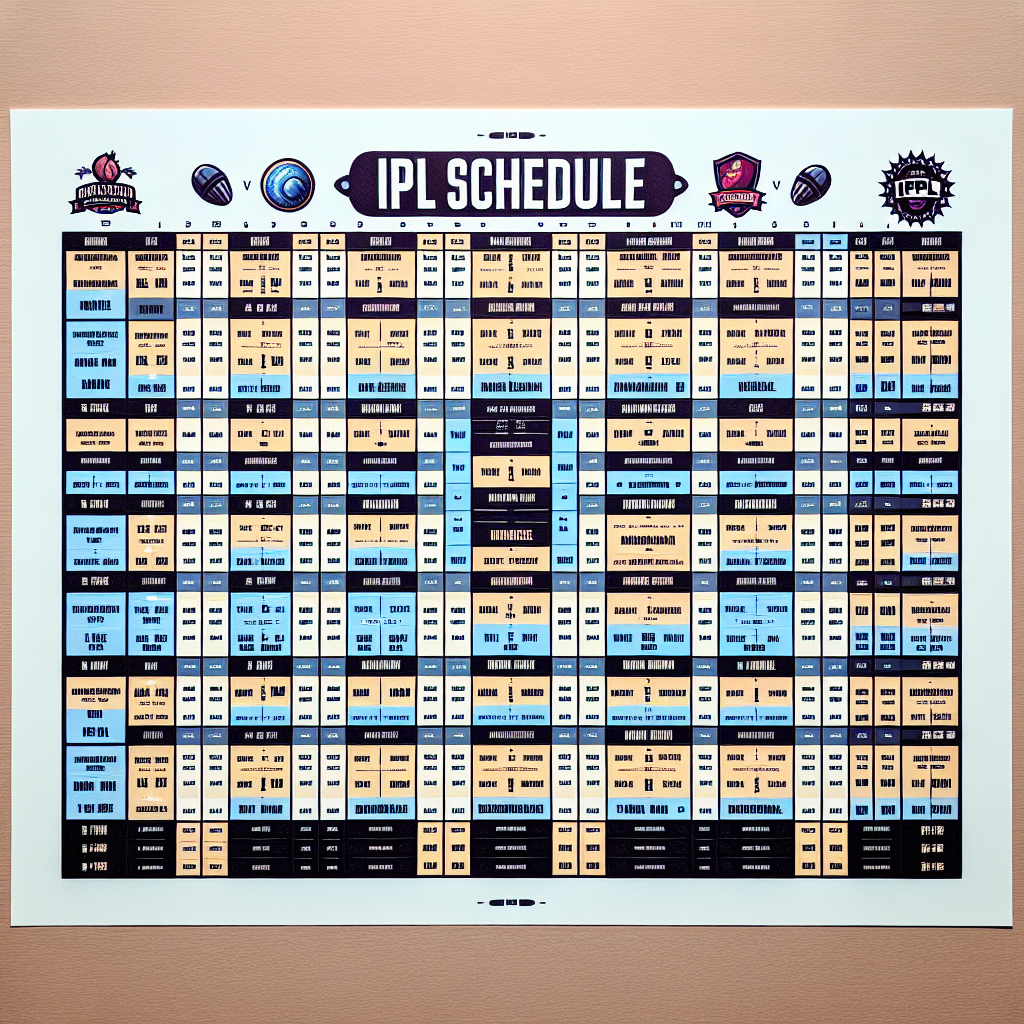
The Indian Premier League (IPL) is one of the most celebrated cricket tournaments globally, attracting millions of viewers each year. The schedule of IPL matches is a crucial aspect that determines the flow and excitement of the tournament. This article delves into the intricacies of the IPL schedule, offering insights into its structure, significance, and the factors influencing its formulation.
The Structure of the IPL Schedule
The IPL schedule is meticulously crafted to ensure a seamless and engaging tournament. It typically spans over two months, featuring a series of matches that culminate in a grand finale. The schedule is divided into several phases, each with its unique characteristics and significance.
1. Group Stage
The group stage is the initial phase of the IPL, where all participating teams compete against each other. The schedule is designed to ensure that each team plays a balanced number of home and away matches. This phase is crucial as it sets the stage for the playoffs.
- Each team plays a total of 14 matches.
- Matches are scheduled to maximize viewership, often held in the evening.
- Teams are ranked based on their performance, with the top four advancing to the playoffs.
2. Playoffs
The playoffs are the penultimate phase of the IPL, featuring the top four teams from the group stage. The schedule for the playoffs is designed to heighten the excitement and ensure a fair chance for all teams.
- Qualifier 1: The top two teams face off, with the winner advancing to the final.
- Eliminator: The third and fourth-ranked teams compete, with the loser being eliminated.
- Qualifier 2: The loser of Qualifier 1 and the winner of the Eliminator face off for a spot in the final.
3. The Final
The final is the most anticipated match of the IPL, determining the champion of the tournament. The schedule for the final is strategically planned to ensure maximum viewership and engagement.
Factors Influencing the IPL Schedule
Several factors influence the formulation of the IPL schedule, each playing a vital role in ensuring the tournament's success.
1. Venue Availability
The availability of venues is a critical factor in scheduling IPL matches. The tournament is held across multiple cities, and the schedule must accommodate the availability of stadiums.
- Stadiums are often shared with other sports and events, requiring careful planning.
- Weather conditions and local events can also impact venue availability.
2. Broadcasting Considerations
Broadcasting plays a significant role in the IPL's success, with millions of viewers tuning in from around the world. The schedule is designed to maximize viewership and advertising revenue.
- Matches are often scheduled during prime time to attract maximum viewership.
- Weekend matches are strategically placed to capture a larger audience.
3. Team Logistics
Logistical considerations for teams, including travel and rest periods, are crucial in scheduling IPL matches. The schedule must ensure that teams have adequate time to travel and prepare for matches.
- Back-to-back matches are minimized to prevent player fatigue.
- Travel schedules are optimized to reduce transit time between venues.
Case Studies: Notable IPL Schedules
Over the years, the IPL has seen several notable schedules that have impacted the tournament's dynamics. Here are a few examples:
1. IPL 2020: The Pandemic Challenge
The 2020 IPL season faced unprecedented challenges due to the COVID-19 pandemic. The schedule had to be restructured to accommodate health protocols and travel restrictions.
- The tournament was held in the UAE, with matches played in Dubai, Abu Dhabi, and Sharjah.
- Strict bio-bubble protocols were implemented to ensure player safety.
- The schedule was compressed, with matches held in quick succession.
2. IPL 2019: The Election Year
The 2019 IPL season coincided with the Indian general elections, necessitating adjustments to the schedule to avoid clashes with polling dates.
- Matches were strategically scheduled to avoid election dates in various states.
- Additional security measures were implemented at venues.
Statistics: The Impact of Scheduling on IPL Success
The scheduling of IPL matches has a direct impact on the tournament's success, influencing viewership, revenue, and team performance. Here are some statistics that highlight this impact:
- According to BARC India, the 2020 IPL season saw a 23% increase in viewership compared to the previous year, attributed to strategic scheduling and increased home viewership during the pandemic.
- A study by Duff & Phelps estimated the IPL's brand value at $6.8 billion in 2019, with scheduling playing a key role in maximizing advertising revenue.
- Teams with favorable schedules, including adequate rest periods and minimized travel, have shown improved performance in the tournament.
Conclusion: The Art and Science of IPL Scheduling
The schedule of IPL matches is a complex yet crucial element that contributes to the tournament's success. It requires a delicate balance of various factors, including venue availability, broadcasting considerations, and team logistics. Notable schedules from past seasons highlight the challenges and innovations involved in crafting an effective schedule. As the IPL continues to grow in popularity, the art and science of scheduling will remain a vital component in delivering an exciting and successful tournament.
In conclusion, understanding the intricacies of the IPL schedule offers valuable insights into the tournament's dynamics and its impact on teams, viewers, and stakeholders. As fans eagerly await each season, the schedule remains a key factor in shaping the excitement and anticipation that defines the Indian Premier League.

